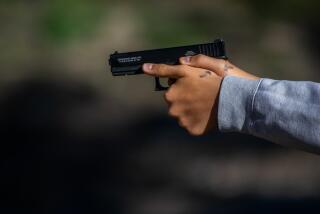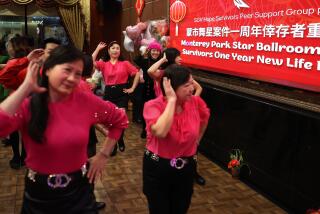After mass shooting, Fresno’s Hmong community is left mourning and afraid
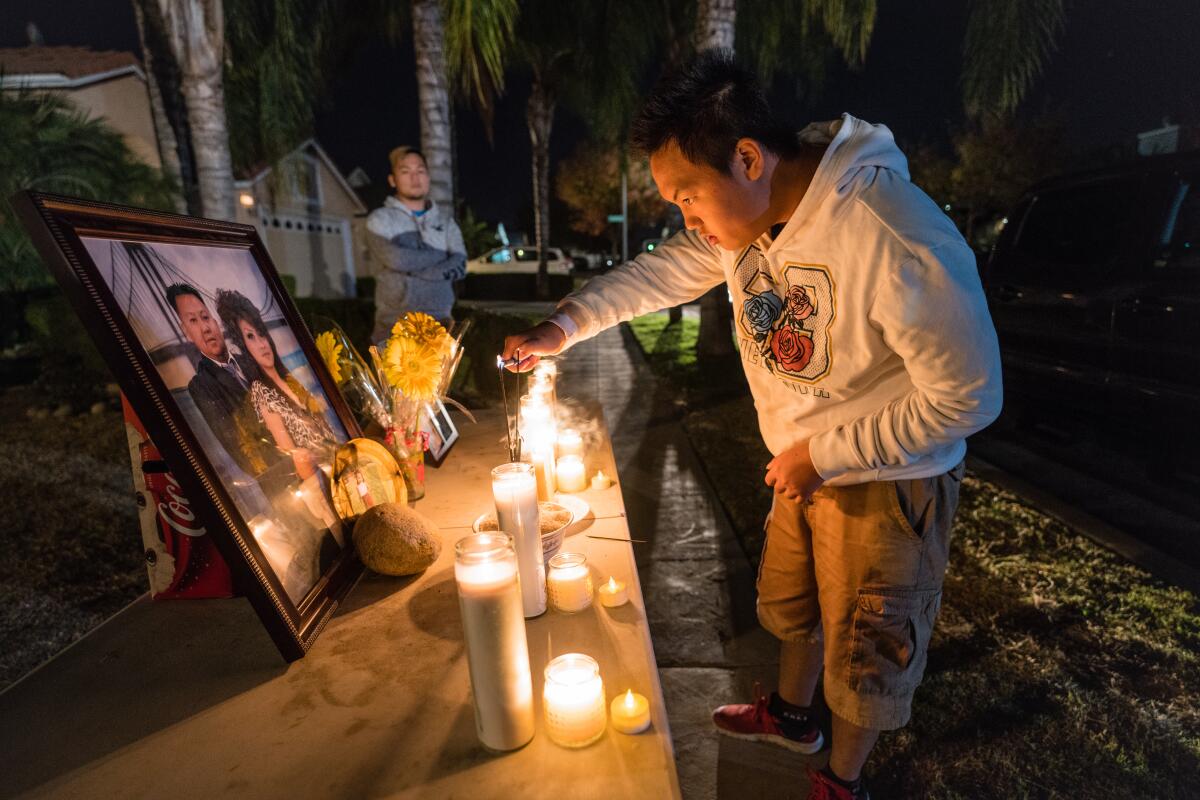
- Share via
FRESNO — On the second night of candlelight vigils outside the Fresno home where four men were killed Sunday in a mass shooting, the daughter of one victim looked up at the sky and spoke directly to her father.
“I love you, Dad,” 5-year-old Alina Xiong said into a microphone. “Can you hear me? I love you so much.”
Her father, Kou Xiong, was described by those close to him as a big-hearted person, the kind of family man who would come home from his job as a sushi chef to gingerly steam vegetables that suited his father’s restricted diet.
Kou, 38, especially loved bringing friends together for football games. He would hold viewing parties nearly every weekend of the season, often recording them on Facebook Live. His favorite team was the San Francisco 49ers.
It was on one such night that Kou and 30 of his friends and family gathered at his home in a majority Hmong neighborhood of southeast Fresno. As night fell, the men, clad in football jerseys, stayed in the backyard watching the Los Angeles Rams take on the Chicago Bears, while women and children retreated inside.
At 7:48 p.m., two men sneaked into the backyard through an unlocked side gate. The partygoers saw flashes of light coming from two pistols but couldn’t see the men behind them, police said.
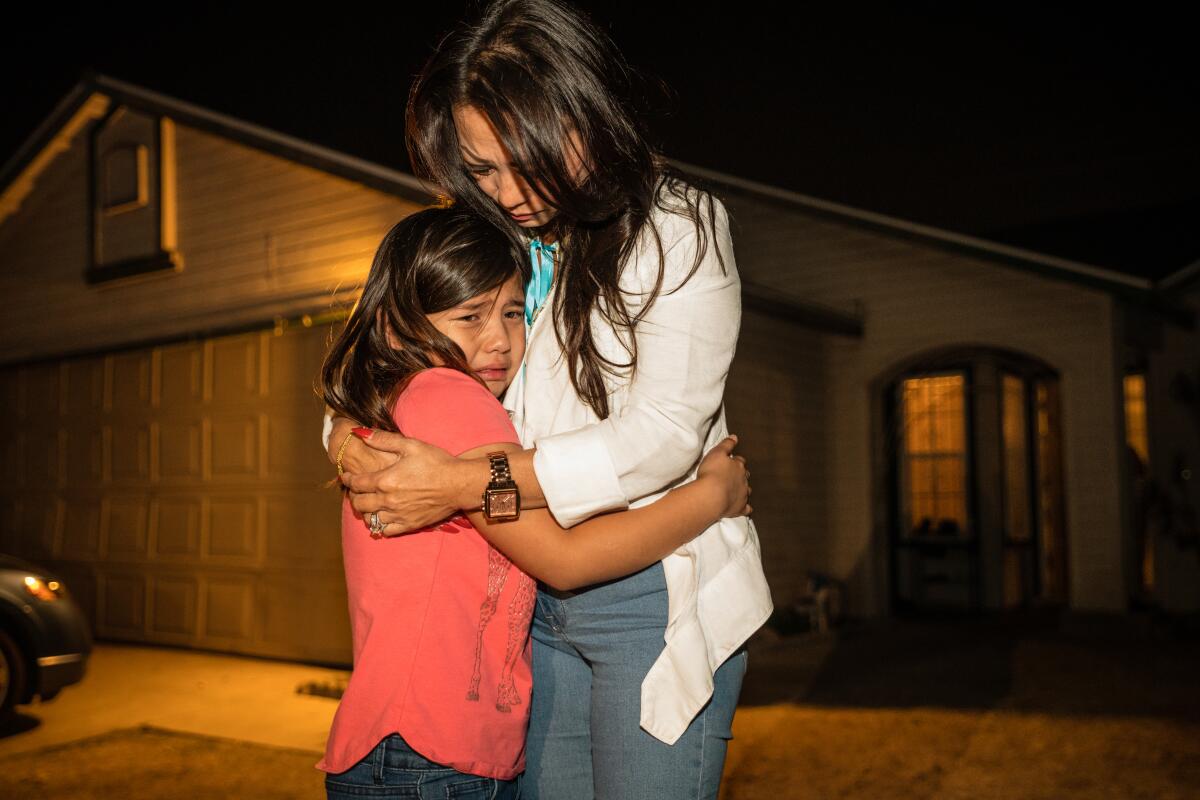
Officers arrived to a devastating scene. They attempted CPR on the wounded men, leaving their uniforms covered in blood. Ten men were shot, and four died: Kou, Xy Lee, 23, Phia Vang, 31, and Kalaxang Thao, 40.
Five days later, the suspects remain unknown.
Grieving families and other members of the Hmong community — some from as far as Sacramento — have gathered nightly to mourn on the sidewalk just outside the home where Kou had grown up after his family emigrated from Laos in 1994.
Sunday’s killings have brought sudden, unwanted attention to one of the nation’s largest Hmong communities, second only to that of Minneapolis. As its members search for explanations, they also are coping with international media coverage and reacting to suggestions by police that the killings were gang-related.
Many Hmong immigrants in California, including Kou’s family, are survivors of the so-called Secret War that followed the 1975 collapse of the kingdom of Laos, where they are considered an ethnic minority. Hmong people fought alongside U.S. troops against communism there during the Vietnam War, making them targets after the Laotian communist government took over.
Most refugees fled to camps in Thailand before being resettled in the U.S. California now has the largest Hmong population in the country, with nearly 100,000 people — more than 30,000 in Fresno alone.
The last substantial influx of Hmong refugees being resettled in the U.S. started 15 years ago. Since then, the community in Fresno has celebrated its first Hmong City Council member being elected in 2006 and the establishment of a museum celebrating 40 years of Hmong history in 2015. The Hmong New Year event held at the Fresno Fairgrounds attracts thousands of people and is regarded as the largest in the country.
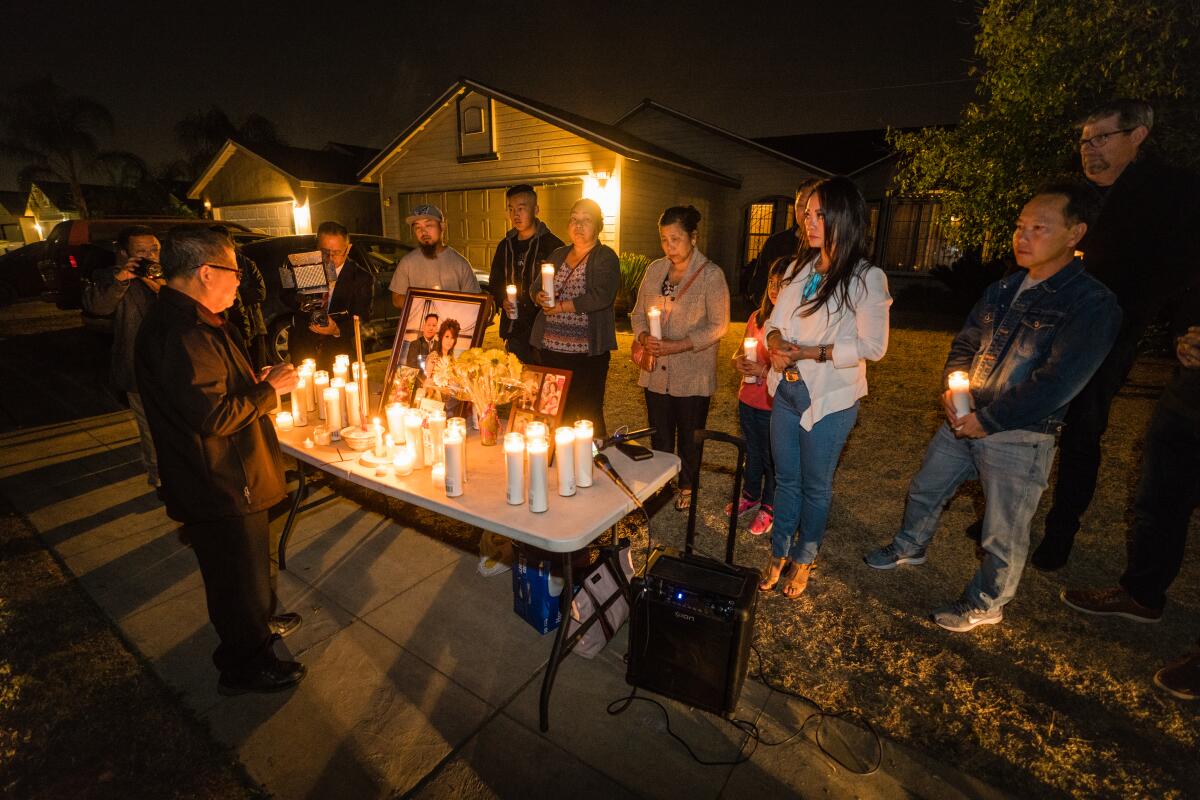
On Tuesday, a plastic folding table was set up outside the Xiong home with three dozen candles, incense sticks, bouquets of sunflowers and carnations, and framed photos of the victims. The largest photo in the center, propped up with a 12-pack of Coca-Cola, showed Kou posed in a black suit and silver tie, his short hair brushed back, an arm around his wife.
Inside the family’s home was a large aerial view poster of the Ban Vinai Refugee Camp in Thailand, where they lived before moving to Fresno after Kou’s father, Cha Lee Xiong, fought in the Secret War.
When the shooting started on Sunday, Cha Lee was seated at a desk in his bedroom, praying for a long and healthy life. He walked out to see his youngest son’s life taken early.
“I don’t want anybody to misunderstand us,” he said through an interpreter. “I am a good person, and I know my son is good.”
Fresno Police Department officials expressed contempt toward the people responsible for the shooting and concern that the attacks might continue. They said they had created an “Asian gang task force,” adding that they feared further violence, particularly because upcoming New Year celebrations will draw hundreds of Hmong into the area.
Police said there were no indications that any of the victims had gang ties, and acknowledged that they don’t know what the suspects looked like or whether they were part of a gang. They think the home on Lamona Avenue was targeted, though they didn’t elaborate.
Chief Andy Hall said that violence perpetrated by Asian gangs has increased in recent years, with 11 criminal incidents so far this year.
Speaking rhetorically to gang members, Hall said, “We’re coming for you.”
In the aftermath of the shooting, Fresno leaders announced that they hope to raise $500,000 through an online fundraiser to help the affected families pay for medical expenses and funeral costs. Just over $9,000 had been raised as of Thursday afternoon. Valley Crime Stoppers is offering a $15,000 reward for tips leading to an arrest.
At a news conference Wednesday, Mayor Lee Brand said the city is committed to helping the community heal and that the tragedy “does not speak for the city of Fresno.”
Meanwhile, a team at the grassroots civic involvement group Hmong Innovating Politics organized healing sessions with young people. At their first sit-down earlier this week, participants opened up about not being able to concentrate in class and being scared to return home to the same neighborhood where the shooting took place.
Some Fresno residents were disappointed with the police department’s announcement of the Asian gang task force before having a clear indication that the tragedy was gang-related.
“Labeling it as gang violence minimizes it, like it is not part of a bigger issue of gun violence affecting the whole country,” said Nancy Xiong, development and communications director for HIP. “Many Southeast Asians are still being categorized as involved in gangs. You have a situation where you don’t feel safe in your house anymore, but somehow, it’s your fault. Now in this situation, we don’t want to rush to judgment.”
Some victims’ relatives were too afraid to speak out about the shooting. Others, including the parents of Phia Vang, asked that their names be withheld out of fear that they could be targeted next.
Vang’s parents described him as a social, fun-loving sports enthusiast who amassed a collection of valuable football and basketball jerseys. He took up guitar and drums three years ago and practiced often with his good friend Xy Lee.
Vang worked at a diagnostic center delivering clinical lab results and was one of the primary providers for his parents and five siblings. The family now worries how they’ll get by on his 51-year-old father’s supermarket job income alone.
In Hmong family tradition, the oldest children play a significant role in caring for younger siblings. Vang’s parents said the loss of their eldest son was particularly painful because of that.
After the shooting, his father repeatedly flipped through videos of his son playing the drums in their living room and ordering ice cream during a trip to Thailand earlier this year.
Vang was especially close to his mother — he’d often come home from work during his lunch break to eat her homemade larb, a traditional dish made with minced beef, chicken or pork. On Sunday, he told her that he was going to watch football with his friends. “I’ll be right back,” he told her.
The 47-year-old woman was still in shock over the tragedy. “I feel that I don’t even know myself,” she said Wednesday through an interpreter.
The youngest person killed, Vang’s friend Lee, was a well-known Hmong singer with 95,000 subscribers on YouTube. One of his most popular music videos, with 3.6 million views, is for a song called “You are my life.” The video, which features his girlfriend, SuabNag Yaj, shows him wearing a suit and her in a long, flowing dress, frolicking through a grassy meadow. Family members said the song is about their love story and plans to start a life together.

Lee and his family moved to Fresno from Long Beach last year. His brother Kou Lee, 31, said Xy taught himself to play music at 8 years old and was naturally gifted. He started performing at weddings and graduations at age 14 before booking bigger venues such as the Hmong New Year celebration in Fresno in recent years.
Xy’s life revolved around music; his dream was to open a music studio. Family members said he kept the house warm with his upbeat energy and constant singing.
“The house is very quiet,” Kou said. “It’s totally different.”
KaShoua Thao, host of the “Gen X Show” on KBIF-AM (900), said she and her partners weren’t sure if they should dedicate a segment to Xy and the other victims because they worried that playing his music so soon might be too painful for some listeners.
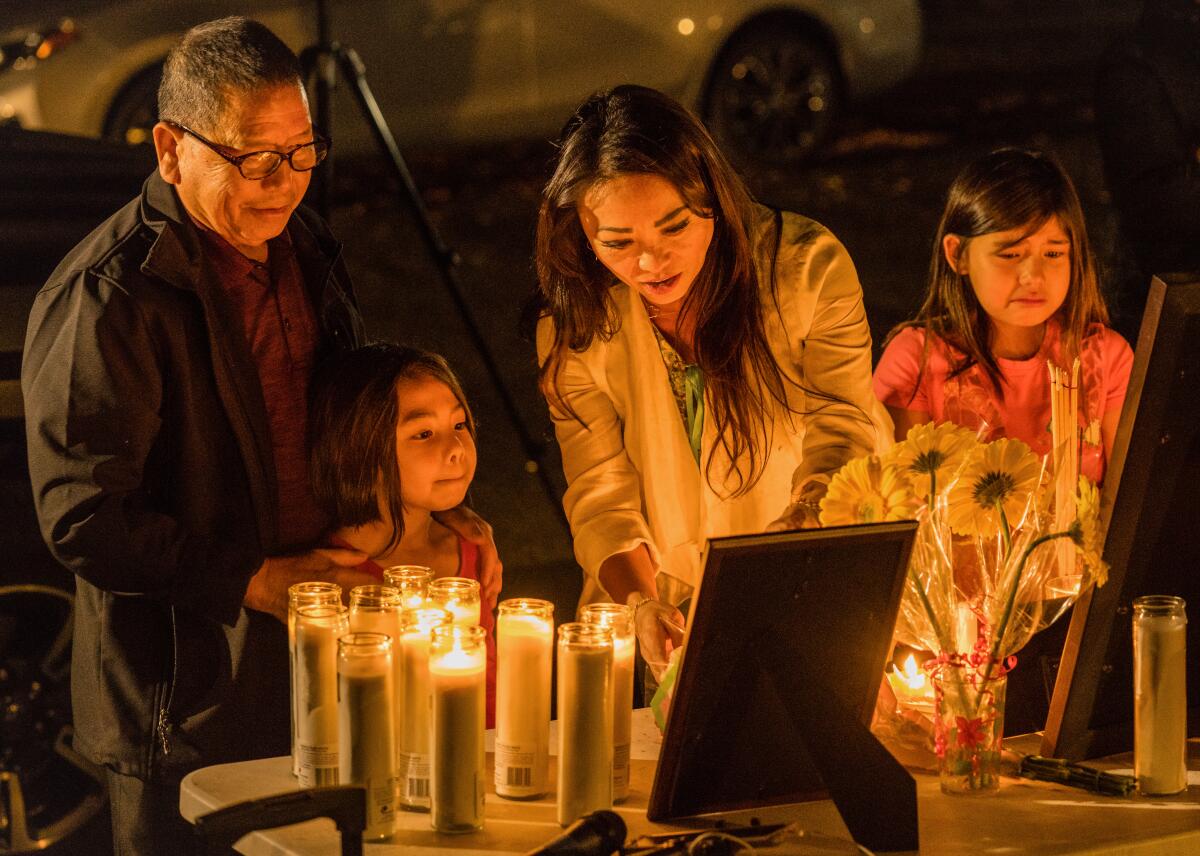
Yet the tribute, broadcast via Facebook Live, led to an outpouring of condolences from across the nation and the globe.
“It is a testament to Xy Lee’s impact as an artist, as well as how big of an impact this incident had on the Hmong community worldwide,” Thao said, stressing that in the Hmong community, “we address even complete strangers as family members.”
“Many called these victims their sons and brothers,” Thao added. “We quickly realized listeners were seeking a common place to mourn together as a family.”
Photographer Tomas Ovalle contributed to this report.
More to Read
Sign up for Essential California
The most important California stories and recommendations in your inbox every morning.
You may occasionally receive promotional content from the Los Angeles Times.

